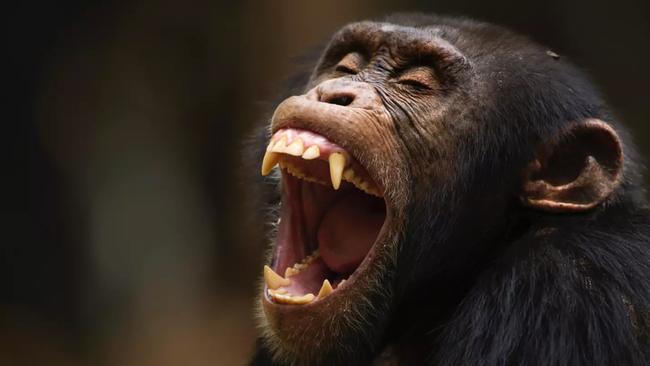‘They no longer fear humans’ – how Bossou’s chimps became killers
Locals took out their anger on scientists when a male chimpanzee tore an eight-month-old human baby from her mother’s back and disappeared into the forest.

Since the chimpanzees of Bossou in west Africa were first observed using stone hammers and anvils to cut their food into bite-sized pieces, they have been objects of fascination for academics and tourists.
For decades scientists have trekked to a remote site in southeastern Guinea to study the wild chimp family exhibiting the most sophisticated behaviour recorded in mankind’s closest relative.
The primates live on the slopes of the Nimba Mountains around a subsistence farming community that believes the chimps are the reincarnation of their ancestors.
The two species have shared the space for generations – although as the human population swelled, the number of apes dwindled to just four. Now that proximity has turned violent. Ten days ago one of two surviving male chimpanzees tore an eight-month-old human baby from her mother’s back and disappeared into the forest to kill the child.
Witnesses claimed the baby girl had been eviscerated by the chimp, perhaps using tools. The organs had been harvested for food, some reports said.
The local community’s vengeance was immediate and violent. The target for their rage was not the chimpanzees, however, but the scientists who study the animals. “It’s the way she was killed, that’s what angered the population,” said Joseph Dore, a young member of the group from Bossou that attacked the Bossou Environmental Research Institute, built by Kyoto University in 1976, as foreign and local researchers fled.
Papers and equipment including computers, camera traps and drones were piled up and set on fire, gutting the international research facility. Only when the army deployed was calm restored.
Protesters also brought the tiny, mutilated body of the baby, named as Yoh Helene, to the facility to highlight the danger of meddling with their community.
Cultivation of the chimps’ habitat and a new road network has locked the animals into a 16sq km pocket of forest. While their familiarity with humans and their genetic and geographic isolation have made them ideal subjects for study, they have been cut off from potential mates living over the hills. Consequently the troop’s extinction looms – and with it the loss to science of their unique repertoire of skills.
Hunger had driven the chimp to kill, Dore told the Guinea News website. A project to plant a green corridor to connect the Bossou chimps with other groups over the mountain had displaced farmers from their land and left animals and humans short of food, he said.
The villagers and the great apes had lived peacefully before researchers, foreign donors and government officials arrived, he said.
Moussa Koya, another youth leader, said the chimps’ crop-raiding had involved attacks on women and children: “It was not their will (to be violent) but it has become the habit of the chimpanzees.” A teenager is recovering in hospital with a head injury from a recent clash.
Bossou institute chief researcher Gen Yamakoshi was in Japan when the site was attacked. He had studied the chimp community for more than 30 years and his explanation for the fatal case was simple.
“They no longer fear humans,” he said in a call from Kyoto. He said he regarded the death and other recent injuries as accidents. “It is not clear if the accidents are as a result of food or excitement. It is similar behaviour to how chimps treat one another. If they are excited they cannot control their behaviour,” Yamakoshi said.
A 27-year-old male called Jeje was the likeliest member of the group to have taken the baby, but the claims of mutilation sounded unlikely, Yamakoshi said. Jeje’s mother Jire, who was born in 1958, is one of the two surviving females.
Not in dispute, though, is that the generations-old relationship between Bossou’s humans and its family of western chimpanzees, one of four subspecies of chimps spread across Africa, has changed.
Decades of data have been amassed on the complexity of the group’s minds and behavioural adaptations. Their exceptional use of technology to process food has inspired headlines around the world, as well as the David Attenborough-narrated BBC documentary Chimpanzees: Toolmakers of Bossou. Studies of their mourning rituals, road navigation and taste for fermented palm sap stirred the curiosity of scientists and foreign tourists – increasing the risk of dangerous over-habituation.
For years the research site has provided many jobs to a remote community with few opportunities for its younger members. But Yamakoshi can accept that local resentment has built towards outsiders’ plans for the chimps and the land that has left many locals “feeling left behind”.
Little remains of the facility, institute head Paul Lamah said. “The luggage of the Japanese, the mattresses of the foreigners and students, as well as the facilities, everything went up in smoke. Nothing is salvageable in that building,” he told the Guinea News website.
It is the village’s now-strained bond with the chimps that concerns Bossou elder Michael Gamada Koiba: “We no longer know what kind of chimpanzees they are. The chimpanzees we had here had a good relationship with us and did not kill a child.”
The Times


